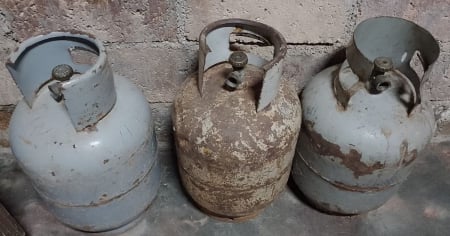The situation at the bank in the municipality of Jovellanos has caused discontent among the population, particularly among workers who, after long hours on the job, are forced to spend hours in line to withdraw just a fraction of their salary. This scene, which has become commonplace in various parts of the country, reflects the liquidity crisis and the enforcement of the banking system, which has further complicated access to cash.
More than 150 people, mostly workers and retirees, gathered in front of the Jovellanos bank branch, where they reported that they are only allowed to withdraw a portion of their salary. "The bank only pays out on Tuesdays and Thursdays, so many of us have to miss work in order to get paid," recounted one of those affected. This measure, rather than benefiting users, has caused chaos, long waits, and outrage among the population.
The testimonies indicate that out of the 4,000 pesos a worker could receive, they are only allowed to withdraw 2,000. To make matters worse, the money is given in low denomination bills, such as 5, 10, or 20 pesos. This creates significant discomfort, as many micro, small, and medium-sized enterprises do not accept these bills for payments, forcing people to seek alternatives to exchange them, which further heightens their desperation.
"We're so modern now that we have a card, but there's neither enough energy nor enough money," remarked a citizen with evident irony and frustration. This comment highlights the contrast between the official discourse on the modernization of the banking system and the harsh reality that the population faces daily.
The problems accessing cash are not exclusive to Jovellanos. In various cities across the country, Cubans face long lines, limits on the amount of cash they can withdraw, and low-denomination bills, complicating access to consumer goods. In Santiago de Cuba, people queue from early morning to withdraw their pensions or salaries. Workers must endure this situation month after month, leading to complaints about the inhumane conditions they face, particularly the elderly, many of whom spend the night on the streets hoping to access their funds. According to witnesses, “most people don’t even have hope of getting cash,” as banks fail to meet the population's demand.
The process of banking in Cuba, accelerated and mandated by the government, has been identified as one of the main causes of the current liquidity crisis. The president of the Central Bank of Cuba (BCC), Juana Lilia Delgado Portal, acknowledged that "there is more money in the country than ever," but admitted that cash flow has been inverted, leading to difficulties in meeting the public's demand. This situation has prompted the Credit and Commerce Bank (BANDEC) in Sancti Spíritus to suspend ATM top-ups, forcing citizens to withdraw money at branch counters, which in turn has increased long lines and social discontent.
Government measures, such as the recommendation to use the "Caja Extra" service in stores and state-run shops, have not resolved the issue either. Citizens' complaints are frequent, as many of these entities are ill-equipped to provide this service. Meanwhile, the long lines at ATMs and banks across the country reflect the banking system's inability to meet the demand for cash, with critical situations reported in locations such as Santiago de Cuba, Bayamo, Havana, and Las Tunas. The population's grievances focus on the lack of real solutions from the government, which has been unable to address the problem despite numerous public complaints.
Frequently asked questions about the liquidity crisis in Cuba and access to wages.
Why can't workers in Jovellanos access their full salaries?
The liquidity crisis in Cuba and the implementation of the banking system have meant that workers in Jovellanos can only access a fraction of their salaries. Banks only allow the withdrawal of a portion of their wages, and payment days are restricted to certain days of the week, leading to long queues and work absences in order to access their money.
What problems do retirees in Cuba face when collecting their pensions?
Retirees face long lines starting in the early morning to collect their pensions due to a lack of cash at banks and ATMs. The situation is particularly harsh for the elderly, who often have to spend the night on the streets to secure a spot in line. Furthermore, minimum pensions are insufficient to meet basic needs, exacerbating their economic situation.
What measures has the Cuban government taken to address the cash crisis in banks?
The government has promoted mandatory banking and recommended the use of the "Caja Extra" service in state-owned stores. However, these measures have not resolved the issue, as many entities are not prepared to provide this service, and cash shortages continue. The situation has led to an increase in complaints and social unrest.
How does the lack of cash affect small businesses and shops in Cuba?
The lack of cash severely impacts micro, small, and medium enterprises (MiPymes) in Cuba, as many of them do not accept low-denomination bills and prefer cash payments. This complicates transactions and forces citizens to seek alternatives to exchange their bills, increasing frustration and desperation among the population.
What has the Central Bank of Cuba said about the availability of money in the country?
The president of the Central Bank of Cuba has acknowledged that there is more money than ever in the country, but that the flow of cash has become uneven, creating difficulties in meeting the population's demand. Cash is concentrated in the hands of a few, and the government has indicated that it is necessary to act in order to bring the money back into the banking system, although they have not specified how they plan to achieve this.
Filed under:
